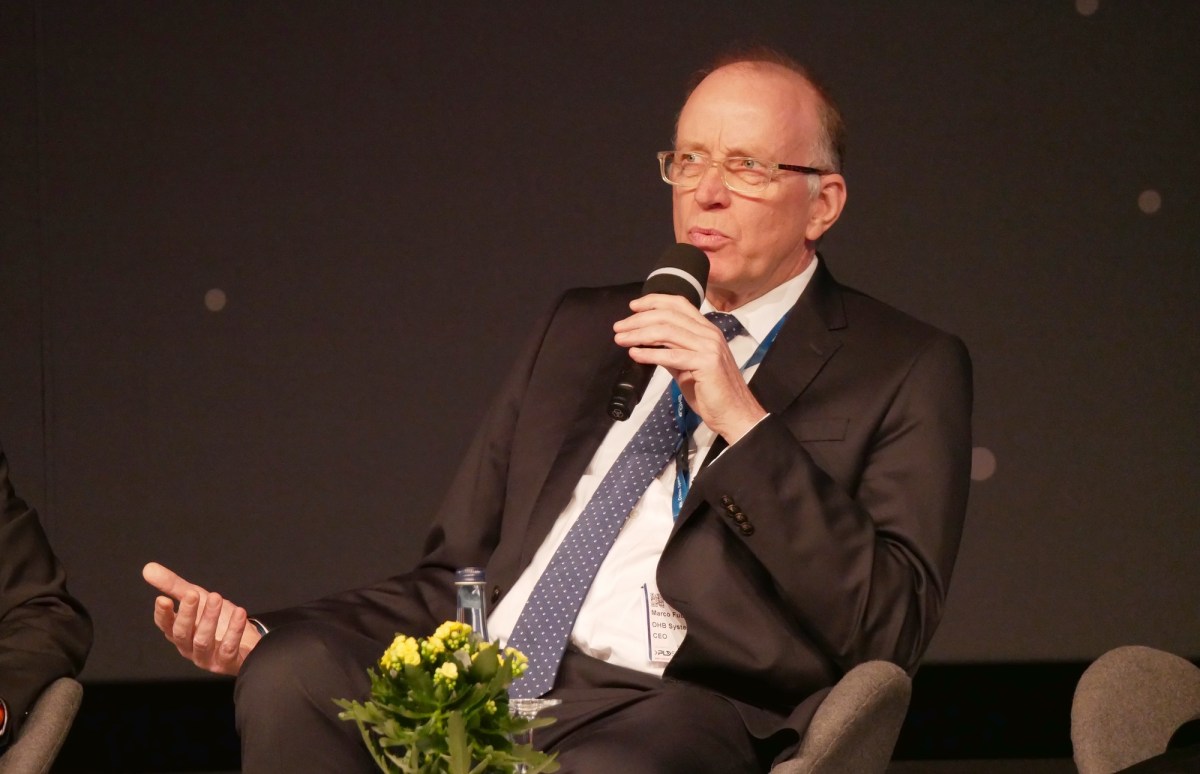WASHINGTON — European space company OHB expects to wrap up a deal with investment company KKR to go private within the next several weeks as it prepares for two key launches this summer.
Marco Fuchs, chief executive of OHB, said in a May 8 earnings call that all that was left to complete a deal with KKR announced in August to take the company private was final regulatory approvals in two countries, Belgium and Germany. He said he expected those countries to sign off on the deal soon.
“We don’t see this as a concern,” he said of the pending approvals. “We feel that this will be completed in the next weeks and we feel that everything should be finalized before our annual meeting at the end of June.”
Under the deal, KKR offered to buy shares on the public market not owned by the Fuchs family, which maintains a controlling stake in the company, for 44 euros ($47.50) per share. As of November, KKR and the Fuchs family owned 94% of all OHB shares.
Fuchs said in November that the reason for the deal was to take the company private, arguing that smaller companies like OHB are “structurally undervalued” on public markets. He said in the earnings call that he expected OHB to delist from public exchanges once the company received the remaining regulatory approvals.
The conclusion of that deal comes as OHB is involved with the first launches of two new rockets in the next several months. Rocket Factory Augsburg (RFA), a launch vehicle company spun out of OHB in 2018, is preparing for the first launch of its RFA ONE rocket from SaxaVord Spaceport in the Shetland Islands. Fuchs said that RFA is gearing up for hotfire tests of the rocket’s first stage at the spaceport soon.
“We are still working under the assumption that we have a launch late in the summer,” he said, with a current no-earlier-than launch date of Aug. 1.
OHB is also a supplier for the Ariane 6, whose first launch is slated for this summer as well. “We are very confident that Ariane 6 will launch within the known launch period from mid-June through the end of July,” he said. “I think preparations are going very well.”
Another Ariane 6 contractor, Avio, offered a similar assessment in its earnings call May 9, projecting a launch some time in July. Neither the prime contractor, ArianeGroup, not the European Space Agency have announced a more specific launch date for the long-delayed inaugural flight of the rocket.
The company also played down reports in German media that the German government was unhappy with the contract being negotiated by the European Commission with an industrial consortium that includes OHB for the Infrastructure for Resilience, Interconnectivity and Security by Satellite (IRIS²) constellation. According to one report, a German minister wrote to EU officials criticizing the management of IRIS² and it scosts, which he claimed was now approaching 12 billion euros, nearly double earlier estimates.
Commission officials had expected early this year to finalize a contract with the consortium by the end of March. However, that contract has not been signed and, in April, Theirry Breton, EU commissioner for the internal market, said only that the evaluation of the contract was ongoing. He did not estimate when that work would be completed.
“I don’t think politics is the major delay for this one. It’s a very complex project,” said Markus Moeller, OHB’s chief strategy and business development officer, on the call. “There’s always politics in the background — it’s a federal program for Europe — but on the other hand, the delays that we see are delays that could be expected in a program of that scale.”
OHB reported revenues of 206.7 million euros in the first quarter, 2% more than the same quarter a year ago. Net profit, though, was down 24% at 7.08 million euros. The company maintained its projection of 1.3 billion to 1.4 billion euros of revenue for the full year.
The revenue OHB reported was a first-quarter record for the company, but Fuchs sounded underwhelmed. “It didn’t feel very exciting, this number,” he said on the call.
